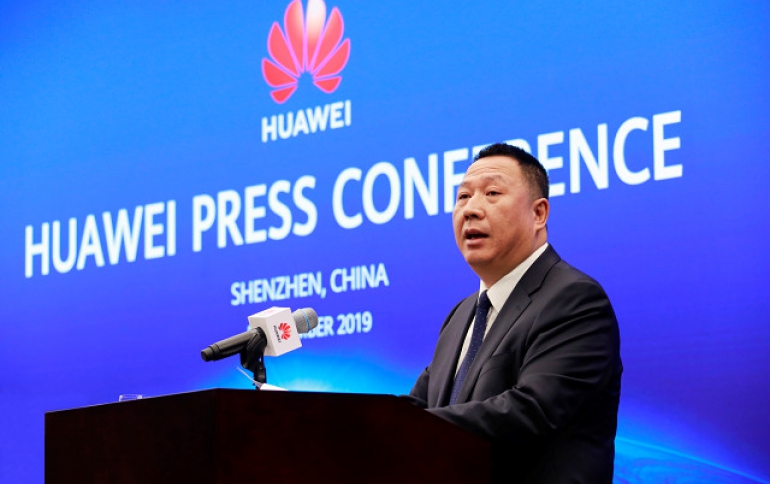
Huawei Asks Court to Overturn FCC Ban From Subsidy Program
Huawei today mounted a legal challenge to the Federal Communications Commission (FCC), seeking the court to overturn an order passed by the FCC which bans carriers in rural America from tapping the Universal Service Fund (USF) to purchase Huawei equipment.
The FCC last month voted unanimously to designate Huawei Technologies Co Ltd and peer ZTE Corp as national security risks, barring their U.S. rural carrier customers from tapping an $8.5 billion government fund to purchase Huawei or ZTE telecommunications equipment.
In a petition filed in the United States Court of Appeals for the Fifth Circuit, Huawei asks the court to hold the FCC’s order "unlawful" on the grounds that "it fails to offer Huawei required due process protections in labelling Huawei as a national security threat." Huawei believes that the FCC also fails to substantiate its arbitrary findings with evidence or sound reasoning or analysis, in violation of the U.S. Constitution, the Administrative Procedure Act, and other laws.
“Banning a company like Huawei, just because we started in China – this does not solve cyber security challenges,” Huawei’s Chief Legal Officer Dr. Song Liuping said at a press conference.
Song said both FCC chairman Ajit Pai and other FCC commissioners failed to present any evidence to prove their claim that Huawei constitutes a security threat, and ignored the facts and objections raised by Huawei and rural carriers after the FCC first made the proposal in March, 2018.
“Huawei also submitted 21 rounds of detailed comments, explaining how the order will harm people and businesses in remote areas. The FCC ignored them all,” he said.
“Carriers across rural America, in small towns in Montana, Kentucky, and farms in Wyoming – they choose to work with Huawei because they respect the quality and integrity of our equipment,” Song added. “The FCC should not shut down joint efforts to connect rural communities in the U.S.”
Glen Nager, Huawei’s lead counsel for the legal action, said the FCC has simply adopted a standard-less rule that, by its own admission, was designed with only Huawei and another Chinese company in mind.
In addition, Nager said the decision adopted by FCC exceeds the agency’s “statutory authority,” as the FCC is not authorized to make national security judgements or to restrict the use of USF funds based on such judgments. “Indeed, the Commission has no national security expertise or authority.”
According to Nager, FCC’s designation of Huawei as national security threat lacks legal or factual support. “The designation is based on a fundamental misunderstanding of Chinese law and on unsound, unreliable, and inadmissible accusations and innuendo, not evidence. The designation is simply shameful prejudgment of the worst kind,” he said.
Karl Song, Vice President of Huawei’s Corporate Communications Department, said the FCC rule is threatening the improving connectivity in rural America, which depends on Huawei equipment because other vendors were not willing to do business in places “that were too remote, or where the terrain was difficult, or where there just wasn’t a large population.” He added that the ban and the following “rip-and-replace” proposal would cost hundreds of millions of dollars and even force some small carriers to go bankrupt.
U.S. President Trump in May placed Huawei on the country’s trade blacklist, citing national security concerns, which banned companies from supplying Huawei with U.S. components without special licenses.
The move came after Washington brought criminal charges against Huawei, alleging theft of trade secrets, bank fraud and violation of U.S. sanctions against Iran. It has also sought to convince allies to ban it from the 5G networks over spying fears - increasing tension with Beijing amid a tit-for-tat trade war.
The United States is now considering means of stopping more foreign shipments of products with U.S. technology to Huawei.
Meanwhile, the Federal Communications Commission Chairman Ajit Pai said on Wednesday he will propose $9 billion in funding over 10 years to boost next-generation 5G wireless coverage in rural U.S. areas.
That figure would be aimed at helping to bring 5G networks to sparsely populated rural areas that often struggle to obtain access to wireless services or the internet.
“We must ensure that 5G narrows rather than widens the digital divide and that rural Americans receive the benefits that come from wireless innovation,” Pai said in a statement.
Pai plans to formally propose rules for the funding early next year.





















